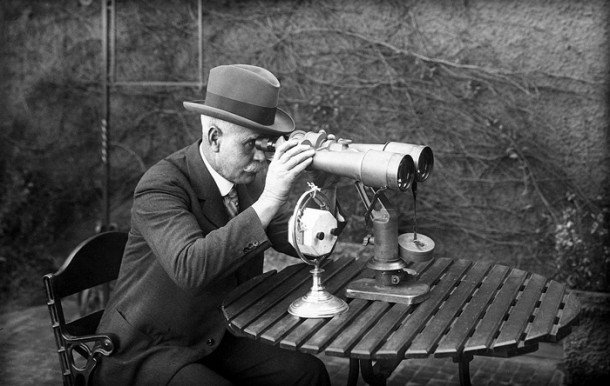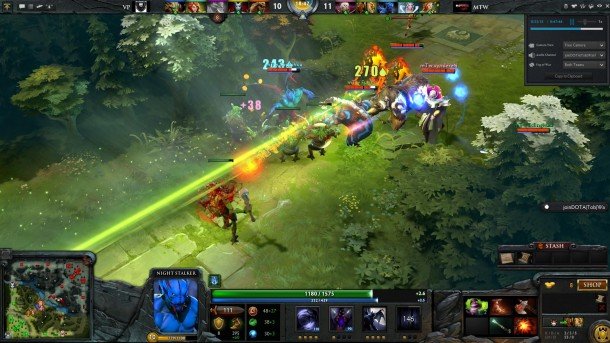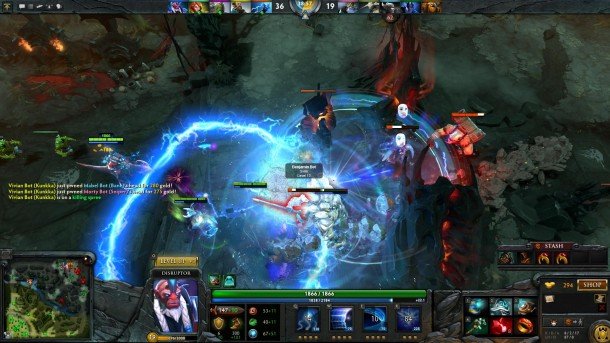So You Wanna Be a Caster - part one

We sent Dota 2 fan and heroic PCG freelancer Quintin Smith on a mission: to become an eSports commentator in three weeks with no prior experience whatsoever. This Sunday, his struggle begins...
Exactly 100 years ago in 1912, an experimental radio station at the University of Minnesota began transmitting tinny, warbling accounts of the school's American football games. This was the world's first ever sports broadcast. I want you to suck on that not unromantic number like an orange wedge, and ask yourself this: Have you considered making a living as an eSports commentator?
In this introductory article, you'll find three things after the jump. Why you'd want to be a caster, how you'd go about doing it, and why it's a craft. Specifically, you'll learn why it's a craft because we've got a half hour video of me attempting eSport commentary for the first time. We'll move on to tips from the pros in pt. 2, but for now? It's the weekend! Sit back, relax and listen to me suffer.

To clarify, yes, today you can make a living from simply talking over other popular competitive games such as Starcraft 2, Dota 2, League of Legends or even Street Fighter. Dota 2 caster Purge meticulously outlines the ladder you'll be climbing in this video , a process that's equal parts simple and intimidating.
Specifically, it's as simple as taking a popular game you know back to front, then building up a YouTube channel to the point where you can make money from adverts, coaching and appearances on specialist websites.
Oh, yeah. You'll also have to be good.
But if you are good? There's a position for you. To parrot a point made by Purge, the eSports commentary scene absolutely has not reached saturation yet. There's a real demand for people who can deliver charismatic commentary, so if you're good, or even just different from what people are used to, there's a place for you. This could be your job.
Keep up to date with the most important stories and the best deals, as picked by the PC Gamer team.

Best of all, if you can make a living now , imagine where you might be in the future. The most heartening slip of information about the rampant growth of eSports comes not from Major League Gaming's 2011 report , in which they show their 225% growth from 2010 or the fact that almost as many 18-24 year old males watched Major League Gaming in 2011 than MTV and Comedy Central combined. What makes me most excited is this quote from legendary eSports caster and producer djWHEAT:
“I've been doing this since 1999, [and I've] seen 'magical' years in the past, whether it was prize purses or gaming on TV... when in reality it was just another stepping stone on the long journey to success.” In other words, don't look at how big eSports are this year. Imagine the scene in 5, 10, 15 years time.
So, if all it takes is to be good... how hard is it to get good?
And so it was that I fired up Fraps, randomly pulled up a high-level replay of Dota 2, and found out.
What follows is a commentary on my commentary.
01:11 – I waste no time in panickedly resorting to the only casting trick I know. Fill dead air by confidently describing what's in front of you. I do this like it's going out of style. I am the Michael Phelps of describing what's in front of me. What's next?
01:27 – ...and it's gone wrong. What you can hear here is genuine surprise in my voice that the teams are attacking each other.
01:36 - “That's all actually entirely fine.” I have no idea what possessed me to keep going at this point. With my commentary or, indeed, my life.
03:42 – Yep.
03:55 – Yep.
04:06 – I realise I've been so busy talking that I have no idea what's going on in the match. Here, the penny drops.
The challenge of commentary is splitting your brain. Half of you has to be watching the match, absorbing and comprehending each team's position, while the other half of your brain describes it. Counterintuitively, describing what's happening in the match doesn't help you to absorb it. It makes it harder.
Excellently, upon having this realisation I start trying to describe it to you guys. This leaves me trying to split my brain three ways. I'm watching the match, describing it, and whinging about how hard it is to do both. Please enjoy the 10 seconds it takes for me to realise that this will be the death of me.
04:40 – In the throes of my shocking performance, I earnestly start believing eSports commentary is actually harder than sports commentary. Clearly I'm forgetting Ty Tyson, America's first well-known sports commentator.
Ty worked in a time when communication networks weren't anywhere near as commonplace. He'd routinely be called to perform radio commentary of a match that he wasn't actually at , but pretended he was as he received minute-by-minute telegraph reports. This was a man capable of talking as if he was at a match from somebody else's notes .
13:20 – I close I brief segment in which I sounded professional by gurgling like a plughole full of beans. Keep on rockin', Quinns.
14:14 – Observe my smooth segue from burbling nonsensically to opening up the graph and sounding important. With only 15 minutes of practice, I'm definitely getting better at this.
14:40 – My “describe what's in front of you” tactic actually has me sounding like a commentator! I AM getting better at this!
15:50 – My “describe what's in front of you” tactic hits a wall as I realise I have no idea what's in front of me. I'm not getting any better at this.
16:20 – You know what? The only difference between the professionals and me is that they point things out 4 seconds before they happen, and I point them out 4 seconds after they happen. That's not a big deal. That's just latency.
20:15 – I mistake an entire team for the other team.
20:17 – I realise I was wrong and that I am in fact looking at the team I initially thought I was. I am too embarrassed to correct myself. This is my nadir, I suspect.
21:12 - “I take a bad!”
22:12 – After some thirty second of trying to remember if it's a phrase that actually exists, I decide to say “four sheets to the wind” anyway. It does exist! That's me. Rollin' the dice. Devil may care. Mostly stupid.
25:49 – Turns out there's no graceful way to step down from ill-timed shouting.
26:19 – Fatigue is setting in now. My mouth feels like an inside-out tennis ball and my brain seems to be coated in sherbet. I am no longer thinking about what I am saying. I am a machine, but not a good one. I am an oven that somebody's accidentally left on.
26:26 - “He's got three sand kings, now,” I state, confidently, knowing I'll have a punchline by the end of this sentence.
26:34 – I have no punchline.
31:06 – I sound surprised when something I predicted actually comes true, skillfully negating any possible kudos with my own shock.
31:21 – Commentator juice.
35:06 – My addled brain is circling the word for “Ancient” like a startled bird. I think I've referred to it as the Aegis and the Immortal so far. Third time's the charm?
35:25 – I end with not wise words, not a conclusion, but a joke stolen from Community. I am the worst. I am human hammer toe.
And we're done.
An utter disaster. But you know what? I just cast my first ever match. I just took my first step on the ladder that only ever goes up.
I'm still going to need professional help, clearly. Come back next week for a selection of the best help those professionals could offer.

